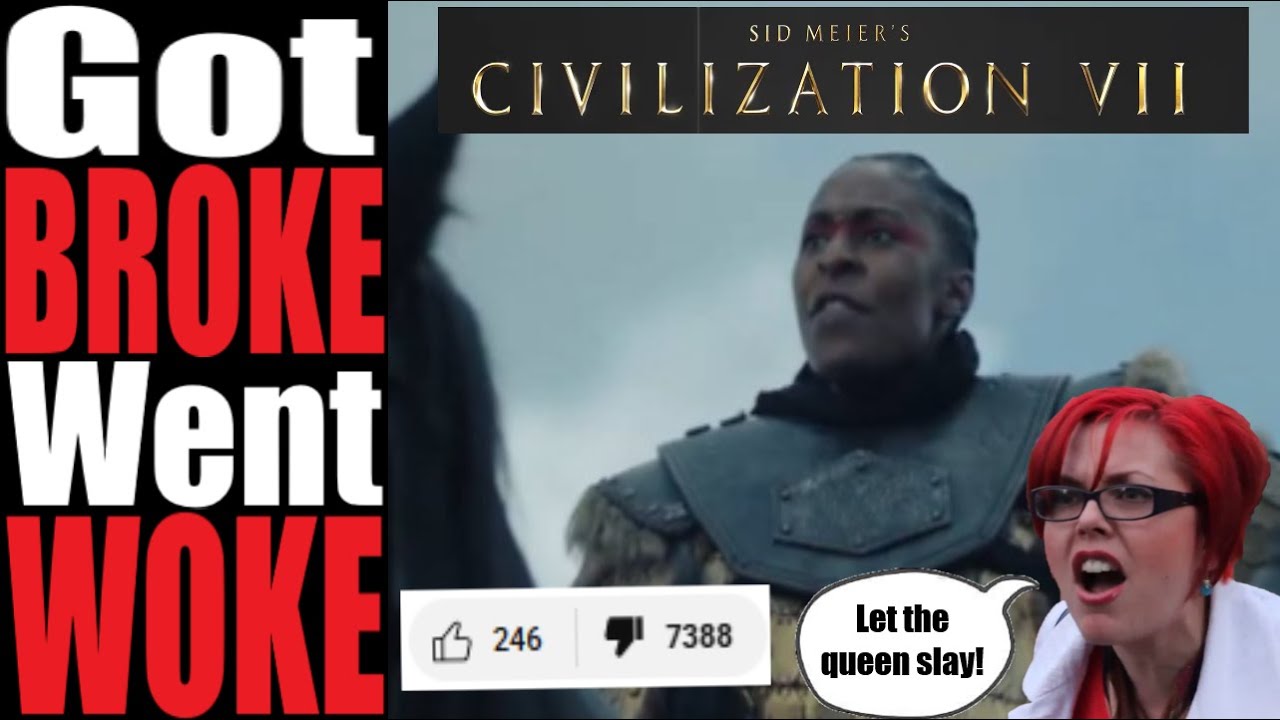The Controversial Trailer: A Black Woman Leading the Mongols
On May 5, 2025, Firaxis Games released a promotional trailer for Sid Meier’s Civilization VII that sent shockwaves through the gaming community. The 20-second live-action clip depicted a Black female warlord leading a group of Mongol warriors, declaring that a captured land would be named “Puddington” to satisfy her “glorious sweet tooth.” The trailer, intended as a humorous take on the game’s creative freedom, sparked immediate backlash, with fans on platforms like X criticizing it as a “cringe” and “historically inaccurate” representation of the Mongol Empire, traditionally led by figures like Genghis Khan. Within hours, the trailer was pulled from official channels, but not before it amassed over 24,000 views, 2,800 downvotes, and a flood of negative comments, with one user writing, “A Black woman leading the Mongols? This is top-tier comedy.”

The backlash centered on the casting of a Black woman as the face of the Mongols, a civilization historically associated with East Asian nomadic tribes under leaders like Temüjin (Genghis Khan). Critics argued that the choice ignored the cultural and ethnic context of the Mongol Empire, which dominated from 1206 to 1368 CE and was known for its horse archers, gunpowder innovations, and multi-ethnic yet predominantly Central Asian identity. However, supporters of the trailer, including some on Reddit and X, defended it as a playful nod to Civilization VII’s new mechanics, which allow players to mix leaders with different civilizations for strategic and creative flexibility. One X user clarified, “She’s the player, not Genghis Khan. It’s a commercial showing the absurdity of Civ.” This controversy, amplified by claims of “DEI gone wrong,” has thrust Civilization VII into a heated debate about representation, historical accuracy, and the role of diversity in gaming.
The Context: Civilization VII’s New Approach
Civilization VII, released on February 11, 2025, introduces a bold overhaul of the franchise’s formula, allowing players to choose civilizations and leaders independently across three distinct Ages: Antiquity, Exploration, and Modern. Unlike previous entries, where leaders were tied to specific civilizations (e.g., Genghis Khan for the Mongols), Civ VII lets players pair any leader with any civilization, such as Cleopatra leading the Mongols or Benjamin Franklin commanding Rome. The Mongol civilization, available in the Exploration Age, is defined by its “Bokh” ability, which grants a free cavalry unit upon capturing settlements and victory points for conquests, reflecting the empire’s militaristic and expansionist legacy. The trailer’s Black female warlord was likely meant to showcase this flexibility, portraying a player embodying a fictional commander rather than a historical figure like Genghis Khan, who is included as a DLC leader in the Right to Rule Collection.
The trailer’s humorous tone, with its exaggerated declaration about “sugary spoils,” aligns with Civ VII’s playful marketing, which emphasizes the game’s ability to rewrite history through player choices. However, the casting choice—featuring a Black woman leading a group of East Asian warriors—struck a nerve, with critics on X accusing Firaxis of prioritizing diversity, equity, and inclusion (DEI) over historical fidelity. Comments like “This is insulting to East Asians” and “Why not a Chinese leading the American Revolutionary Army?” highlighted the sentiment that the portrayal was a provocative “race swap.” Supporters countered that the trailer was not depicting Genghis Khan but a generic player-character, with one X user noting, “It’s a 20-second clip showcasing Civ’s absurdity, not a historical documentary.” The decision to pull the trailer suggests Firaxis underestimated the backlash, which has been compared to controversies like Ubisoft’s Assassin’s Creed Shadows casting debates.
Why the Backlash? Historical Accuracy vs. Creative Freedom
The Mongol Empire, as detailed in Civ VII’s game guide, was a multi-ethnic state that permitted religious freedom and fostered cultural exchange across its vast territory, from Korea to Europe. Led by Genghis Khan, who united feuding clans in 1206, the Mongols were renowned for their military prowess and logistical innovations, such as the Ortöö postal system and the Keshig cavalry unit. While the empire was diverse, its core leadership, including the Borjigin clan, was of Mongol or Central Asian descent, making the trailer’s depiction of a Black female warlord a stark departure from historical norms. Critics argue that this choice disrespects Mongol culture, with one X post stating, “A Black woman in charge of a Mongol army? This is DEI nonsense.”
The backlash reflects broader tensions in gaming over representation. Fans who prioritize historical accuracy feel that Civ VII, a series rooted in real-world history, should reflect the ethnic and cultural context of its civilizations. The Mongols’ depiction as an East Asian-led force in previous games, led by Genghis or Kublai Khan, set expectations that the trailer defied. Some X users accused Firaxis of “going woke” to boost sales, citing Civ VII’s reported lower concurrent player counts (9,466 peak on Steam) compared to Civ VI (162,657 peak). Others, however, argue that Civilization has always embraced anachronisms, pointing to mechanics like Gandhi wielding nuclear weapons or Cleopatra leading modern nations. The game’s new leader-civilization system, designed to encourage creative combinations, supports this view, with one Reddit user noting, “Civ is about rewriting history, not reenacting it.”
Fan Reactions: A Polarized Community
The reaction to the trailer has been fiercely divided. On X, detractors have lambasted Firaxis, with posts declaring, “The trailer was so bad they had to delete it” and “Stop giving money to people who hate you.” Some fans expressed frustration on Steam forums, questioning why the commercial didn’t feature a Mongol-looking leader to reflect historical accuracy. The negative feedback, including racist comments targeting the Black female actor, prompted Firaxis to disable comments on some social media posts, with one X user claiming the studio’s Instagram page removed the trailer due to overwhelming criticism. The controversy has fueled accusations of a “DEI agenda,” with users like @RealAlexJones framing it as part of a broader trend in gaming.
Supporters, meanwhile, have defended the trailer’s intent, emphasizing that Civ VII’s mechanics allow for diverse leader-civilization pairings. On X, one user argued, “She’s obviously the player, not a real Mongol. It’s like criticizing a Call of Duty ad for using celebs instead of soldiers.” Others praised Firaxis for embracing diversity, with a Reddit user stating, “A Black woman leading the Mongols is badass and fits Civ’s spirit of creative freedom.” The debate has highlighted a split between fans who view Civilization as a historical simulation and those who see it as a sandbox for imaginative play, with the latter group arguing that the backlash is rooted in culture war rhetoric rather than genuine concern for accuracy.
The Industry Context: DEI and Gaming Backlash
The Civ VII controversy arrives amid heightened scrutiny of diversity in gaming. Recent titles like Assassin’s Creed Shadows faced similar criticism for their depiction of historical figures, reflecting a broader pushback against DEI initiatives in the industry. Posts on X have linked the trailer to declining sales, with one user claiming, “Civ 7 went broke and went woke,” though Civ VII’s critical acclaim, including a Metacritic score tied for the highest-rated new game of 2025, contradicts claims of commercial failure. The game’s innovative Age system and bold art style have been praised by critics, with IGN calling it “a daring take on the formula,” suggesting that the trailer’s backlash may not reflect the game’s overall reception.
Firaxis’s decision to pull the trailer indicates sensitivity to the backlash, possibly to avoid further alienating fans. However, the move has been criticized as a concession to detractors, with some X users arguing that standing by the trailer could have reinforced the game’s inclusive vision. The controversy also raises questions about the challenges of marketing historical strategy games in an era of polarized cultural debates, where even a humorous ad can become a lightning rod for outrage.
Implications for Civilization VII
The Black female Mongol leader controversy has cast a shadow over Civ VII’s launch, but it also underscores the game’s ambition to redefine the Civilization series. By decoupling leaders from civilizations, Firaxis has opened the door to diverse and anachronistic pairings, aligning with the franchise’s tradition of blending history with player-driven fantasy. The Mongol civilization, with its focus on conquest and cavalry, remains a fan favorite, and Genghis Khan’s inclusion as a DLC leader ensures historical representation. Yet the trailer’s misstep highlights the risks of provocative marketing, particularly when it intersects with sensitive issues of race and culture.
The debate has sparked broader discussions about representation in gaming. Supporters argue that a Black female warlord reflects the universal appeal of Civilization, where players of any background can lead any empire. Critics, however, see it as a disconnect from the Mongol Empire’s historical context, risking cultural erasure. The controversy may influence Firaxis’s future marketing, potentially leading to more cautious promotions or clearer explanations of the game’s creative mechanics.
Looking Ahead: A Lesson in Balance
As Civilization VII continues to roll out DLC through the Right to Rule Collection, the Black female Mongol leader controversy will likely remain a defining moment in its early reception. Firaxis’s bold attempt to highlight the game’s flexibility backfired, but the game’s critical success and innovative mechanics suggest it can weather the storm. The debate underscores the challenge of balancing historical fidelity with creative freedom in a franchise that thrives on both. For now, the pulled trailer serves as a cautionary tale, reminding developers that even a 20-second ad can ignite a global firestorm. As players conquer the steppes with the Mongols or rewrite history with unexpected leaders, Civ VII remains a testament to the power of choice—both in gameplay and in the conversations it sparks.





